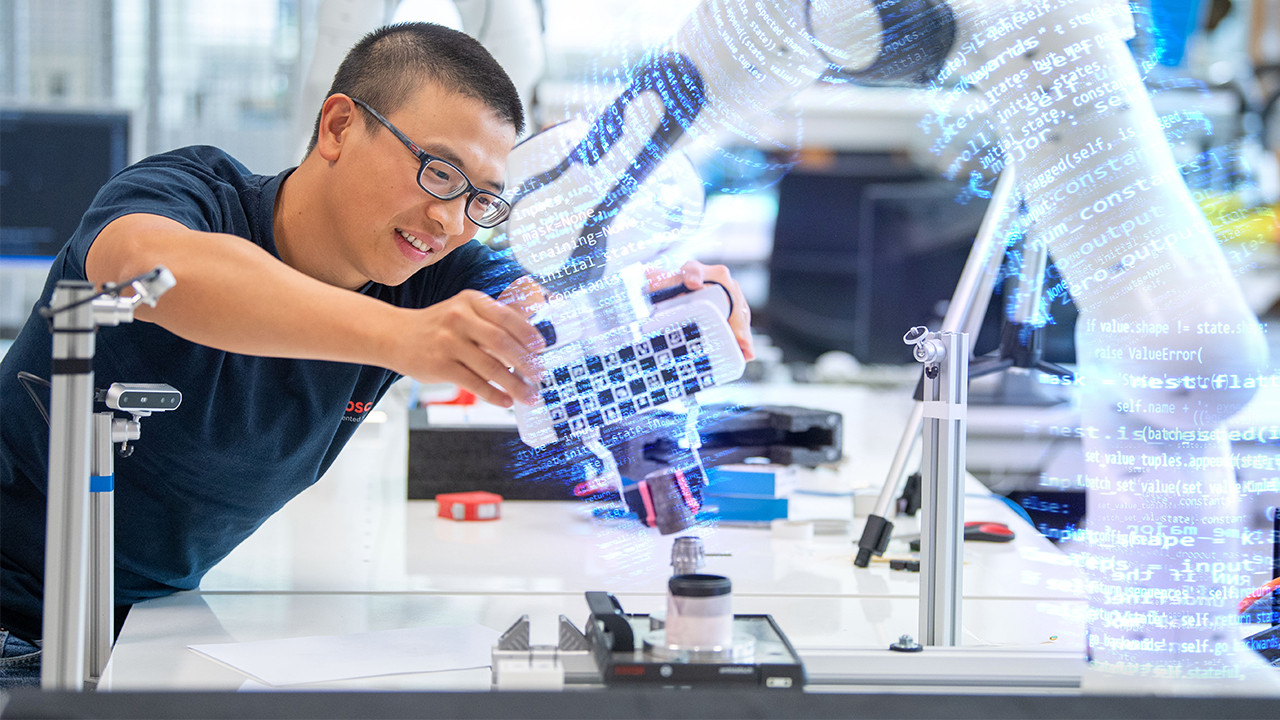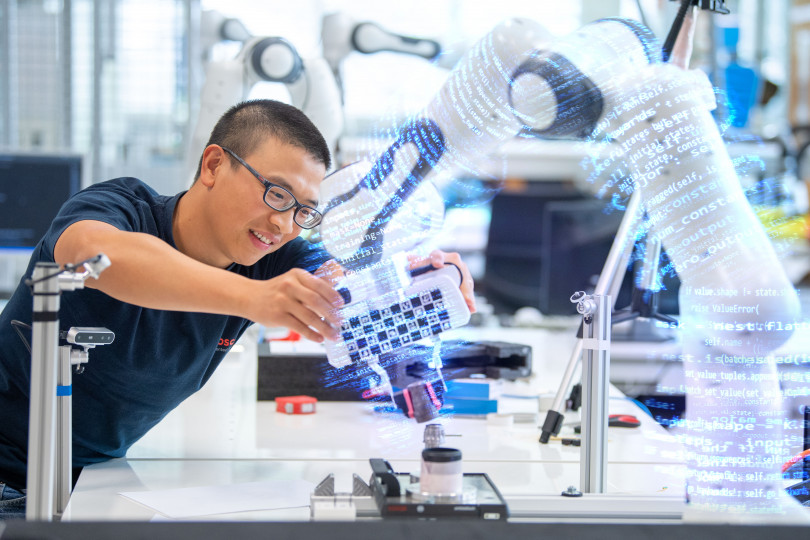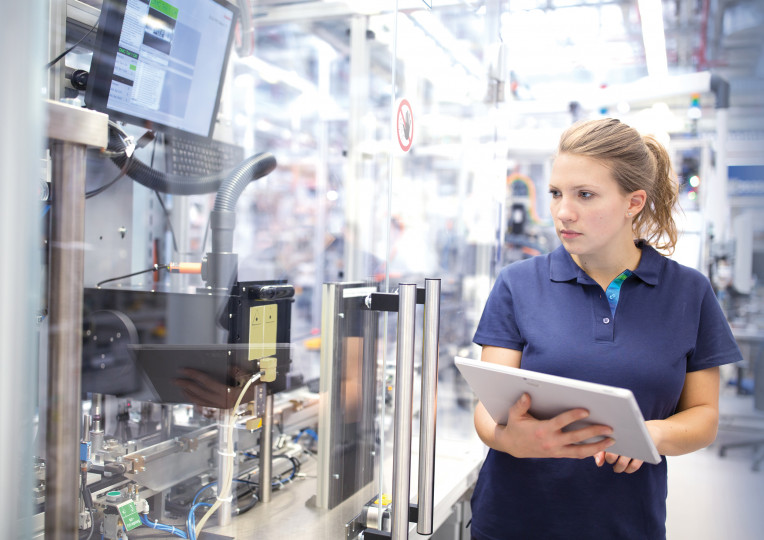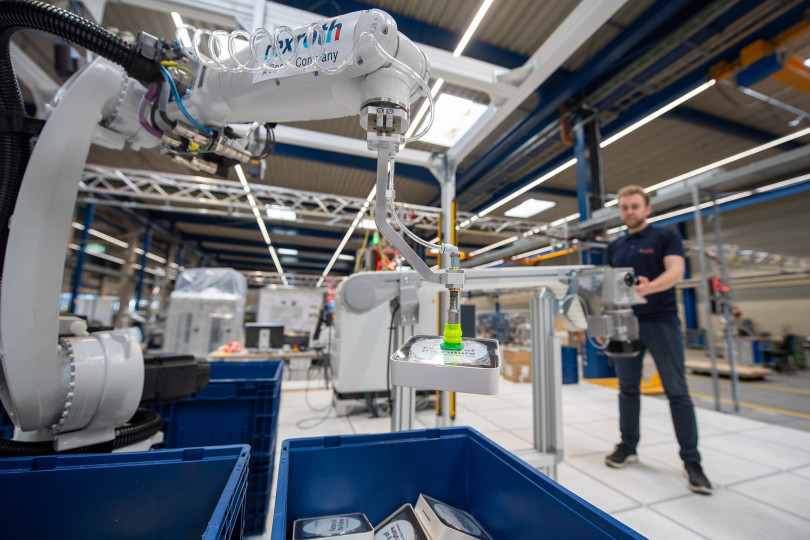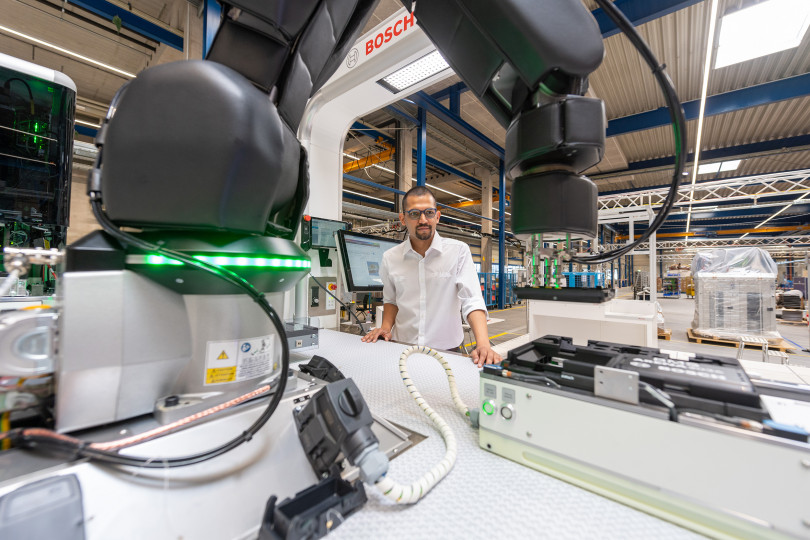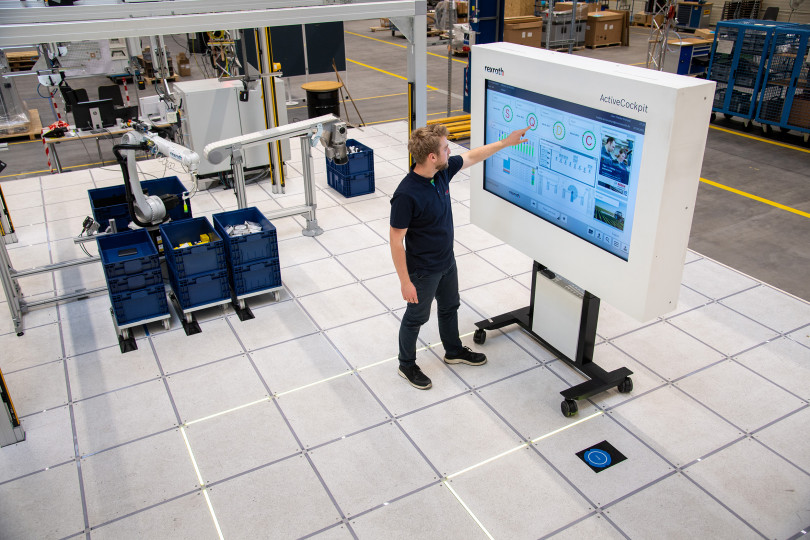Stuttgart, Germany – Industry 4.0 is coming of age. What began at Hannover Messe in 2011 as a “pioneering German project” has now gained global traction – thanks in part to groundbreaking work by Bosch. The aim is for connected manufacturing to optimize itself automatically, making it economical to produce customized products in batch sizes even as small as one. Since 2012, Bosch has been systematically leading factories – both its own and those of its customers – into this new industrial age. This commitment is paying off: over the past ten years, the company has generated more than four billion euros in sales with Industry 4.0. In 2020 alone, Bosch generated sales of more than 700 million euros with connected manufacturing solutions. “We recognized the potential of Industry 4.0 early on and are pioneers in this field.” says Rolf Najork, the member of the Bosch board of management, responsible for industrial technology. The use of Industry 4.0 in the company’s own plants is also paying off. Bosch is combining intelligent software for production control, monitoring, and logistics planning into a manufacturing platform of its own. This connects to a larger database that simplifies and improves tasks such as AI analyses for fault detection. The roll-out of the new Bosch manufacturing and logistics platform will start at the end of 2021. “We offer our roughly 240 plants a standardized ‘Industry 4.0 toolbox,’ which can be expanded and deployed as needed,” Najork says. Bosch believes this will save it almost one billion euros over the next five years, following an investment of around 400 million euros. At this year’s digital Hannover Messe, Bosch charted the development of “ten years of Industry 4.0” and showcase the factory of the future: technologically flexible, intelligently connected, ecologically sustainable – and economically successful.
The status quo: Bosch is making Industry 4.0 the norm
Interest is still high, but too few companies are consistently gearing up for Industry 4.0: “Pilot projects are a good approach for trying things out and getting ideas out there. Now it’s time to up the tempo: we need to make Industry 4.0 the norm,” Najork says. Bosch uses its own academies and training courses to train associates for Industry 4.0 and also makes this offering available to customers. Najork is convinced that “Industry 4.0 is not an end in itself. It’s a way to maintain competitiveness. In the future, nothing will be possible without digitalization.” Bosch projects deliver measurable benefit: connected solutions increase productivity by as much as 25 percent, boost machine availability by up to 15 percent, and reduce maintenance costs by as much as 25 percent. “If we want to exploit the potential of Industry 4.0, we have to move away from isolated solutions. Technical systems that work only within their own boundaries inhibit progress,” Najork says. In Bosch plants, there are now over 120,000 machines and over 250,000 devices such as integrated cameras or robots connected. Some 22,000 machine controllers alone are connected via the Nexeed software for Industry 4.0 developed by Bosch Connected Industry. Founded in 2018, this operating unit has already supplied software to more than half of Bosch’s plants and more than 2,000 production lines. In addition, around 100 international customers rely on Nexeed – including BMW, Sick, and Trumpf. Hardware and software are growing ever closer together. At Hannover Messe, Bosch Rexroth presented its ctrlX Automation platform. Based on app technology and web engineering, this open, 5G-enabled control technology enables co-creation. The idea behind it is for users to either use apps provided by Bosch Rexroth and third-party providers, or to develop apps themselves and share them with other companies within an ecosystem.
Bosch combines Industry 4.0 with other technologies
“Our focus is on harnessing and combining the power of different technologies. Bosch is becoming an AIoT company. We’re bringing artificial intelligence and the internet of things together,” Najork says. At Hannover Messe, Bosch presented the Balancing Energy Network, an AI-based energy management system that employs intelligent software to control and optimize energy flows in factories. Originally developed for manufacturing facilities, the software has the potential to help all types of larger building complexes reduce their environmental footprint, including hospitals, shopping malls, and sports arenas. Technology and knowledge are fundamental stepping stones on the path to climate-neutral manufacturing. Based on its own experience of becoming climate neutral, Bosch has set up a new unit to advise manufacturing companies on how to reduce their carbon emissions. Combining flexible robotics with learning image processing software helps save resources in manufacturing: the APAS inspector takes over the visual inspection of workpieces, inspecting them fully automatically. Meanwhile, smart item picking demonstrates impressive flexibility and precision. The robotic system picks various products delivered by transport vehicles. Using intelligent image recognition, the system picks up different components with no need for prior training and reliably sorts them for further processing or shipping. Thanks to new technologies interactions between humans and machines will be even safer and more efficient in the future: 5G promises reliable wireless data exchange in near real time. Bosch is taking on a pioneering role in this: at the end of 2020, the company put its first campus network into operation at its Industry 4.0 lead plant in Stuttgart-Feuerbach. The company is currently testing 5G applications in around ten plants worldwide. Moreover, Bosch is making products 5G-capable. In the future, Bosch Rexroth’s new Innovation Center in Ulm is where the company will work on progressive approaches and business ideas as well as on developments with customers and partners; the site extension is planned for summer 2021. These developments show that “factories are once again becoming a source of innovation,” Najork says. For the future, he believes three principles are crucial: “First, we have to see Industry 4.0 in holistic terms and focus on end-to-end factory solutions. Second, we need an open architecture to be compatible and user-friendly both in the plants themselves and vis-à-vis customers and suppliers. And third, we must ensure flexibility: in the future, customers will increasingly want customized products. As long as we keep these principles in balance, the ideas that emerge from the manufacturing industry will change the world for the better.”
Bosch supports Hungarian SMEs’ in the adoption of Industry 4.0
Industry 4.0 plays a key role in Bosch’s activities also in Hungary. For example, Industry 4.0 solutions are used in the company’s own plants. Furthermore, Bosch Rexroth Kft., as a pioneer of the fourth industrial revolution, took on itself the mission of wide dissemination of related knowledge and the task of presenting the potential benefits of the solution to domestic small and medium-sized enterprises (SMEs). In line with these goals Bosch has joined the Hungarian government’s supplier development programme in 2017, to facilitate the local suppliers’ development efforts in Industry 4.0, the necessary knowledge transfer and capacity building. The experts from Bosch Rexroth Kft. provide training for the SMEs on a regular basis within the framework of this programme. They are presenting the wide range of different applications of Industry 4.0 from cobots (collaborative robots) through production managements systems all the way to state-of-the-art intralogistics solutions.
Mónika Hack
+36 70 510 5516
The Bosch Group is a leading global supplier of technology and services. It employs roughly 394,500 associates worldwide (as of December 31, 2020). According to preliminary figures, the company generated sales of 71.6 billion euros in 2020. Its operations are divided into four business sectors: Mobility Solutions, Industrial Technology, Consumer Goods, and Energy and Building Technology. As a leading IoT provider, Bosch offers innovative solutions for smart homes, Industry 4.0, and connected mobility. Bosch is pursuing a vision of mobility that is sustainable, safe, and exciting. It uses its expertise in sensor technology, software, and services, as well as its own IoT cloud, to offer its customers connected, cross-domain solutions from a single source. The Bosch Group’s strategic objective is to facilitate connected living with products and solutions that either contain artificial intelligence (AI) or have been developed or manufactured with its help. Bosch improves quality of life worldwide with products and services that are innovative and spark enthusiasm. In short, Bosch creates technology that is “Invented for life.” The Bosch Group comprises Robert Bosch GmbH and its roughly 440 subsidiary and regional companies in 60 countries. Including sales and service partners, Bosch’s global manufacturing, engineering, and sales network covers nearly every country in the world. The basis for the company’s future growth is its innovative strength. At 126 locations across the globe, Bosch employs some 73,000 associates in research and development, as well as roughly 30,000 software engineers.
The company was set up in Stuttgart in 1886 by Robert Bosch (1861-1942) as “Workshop for Precision Mechanics and Electrical Engineering.” The special ownership structure of Robert Bosch GmbH guarantees the entrepreneurial freedom of the Bosch Group, making it possible for the company to plan over the long term and to undertake significant upfront investments in the safeguarding of its future. Ninety-four percent of the share capital of Robert Bosch GmbH is held by Robert Bosch Stiftung GmbH, a charitable foundation. The remaining shares are held by the Bosch family, by a corporation owned by the family, and by Robert Bosch GmbH. The majority of voting rights are held by Robert Bosch Industrietreuhand KG, an industrial trust. The entrepreneurial ownership functions are carried out by the trust.
Additional information is available online at www.bosch.com, www.iot.bosch.com, www.bosch-press.com, www.twitter.com/BoschPresse

